
NERC’s Standards Committee on Wednesday agreed to shorten the time frame for industry review of the proposed new standards dealing with extreme cold weather, potentially cutting more than a month from the process in hopes of finalizing the standards before the Sept. 30 deadline set by the Board of Trustees.
At their monthly teleconference, committee members approved the posting of EOP-011-3 and EOP-012-1, the two standards proposed by the standard development team (SDT) for Project 2021-07 (Extreme cold weather grid operations, preparedness and coordination) for an initial formal comment and ballot period. They also agreed to waive the standard provisions of NERC’s Standard Processes Manual to allow the following modifications to the development process:
- reduce the initial formal comment and ballot period from 45 days to “as little as 30 days,” with voting to take place during the last 10 days;
- reduce any additional formal comment and ballot periods to as little as 25 days from the standard 45; and
- shorten the final ballot period from 10 calendar days to five.
The idea to shorten the ballot periods was not a surprise for committee members: Howard Gugel, NERC’s vice president of engineering and standards, previewed the suggestion to the board at its meeting last week. (See “Standards Actions,” NERC Board of Trustees/MRC Briefs: May 11-12, 2022.) However, while the measure passed unanimously, some attendees did raise concerns about the consequences of reducing the opportunity for stakeholders to give their feedback.
“This is going to be a lot of work to be done in a very short period of time, so [focusing] on giving stakeholders as much time to work on this [as possible] would be appreciated,” said Kent Feliks, manager of NERC reliability assurance at American Electric Power. “I think we need to be really careful that we’re not missing out on voters, for whatever reason; they might just be off sick. But that’s not a lot of time to get that ballot out.”
In response, Gugel pointed out that the decision to shorten the comment period was “not unprecedented,” having been done for other projects considered pressing, including the previous cold weather standards project. (See NERC Cold Weather Team to Seek Faster Finish.) Latrice Harkness, NERC’s manager of standards development, added that staff will focus on ensuring that industry is given plenty of notification about the reduced time.
Other Standards Actions
The committee also agreed to post two other proposed standards for 45-day comment periods at Wednesday’s meeting:
- MOD-026-2, developed by Project 2020-06 (Verifications of models and data for generators); and
- PRC-002-4, developed by Project 2021-04 (Modifications to PRC-002).
In addition, members approved the generator ride-through standard authorization request (SAR), formally starting a new standard development process aimed at replacing PRC-024-3 (Frequency and voltage protection settings for generating resources). The SAR “proposes to replace PRC-024-3 with a performance-based ride-through standard that ensures generators remain connected to the [bulk power system] during system disturbances,” as recommended by NERC and the regional entities in response to several BPS disturbances involving widespread loss of solar, wind, battery and traditional generation resources.
 Amy Casuscelli, Xcel Energy | NERC
Amy Casuscelli, Xcel Energy | NERCOne note of objection to the generator ride-through SAR was raised by independent member Philip Winston, who said he would have preferred that NERC’s Reliability and Security Technical Committee and its other technical committees had been given a chance to review the SAR before its approval. However, Winston chose to abstain rather than enter a formal negative vote. All other members voted in favor of the SAR.
Chair Amy Casuscelli of Xcel Energy also confirmed that the committee still plans to hold its July meeting in person at Xcel’s offices in Denver. Members will be joined by the Compliance and Certification Committee, which held regular joint meetings with the Standards Committee before the transition to remote work during the COVID-19 pandemic.
“For those of you who haven’t been involved in these joint meetings before, it’s a good opportunity to cross-pollinate between our two committees and touch base on what [we’re] working on and how we can support each other,” Casuscelli said.



